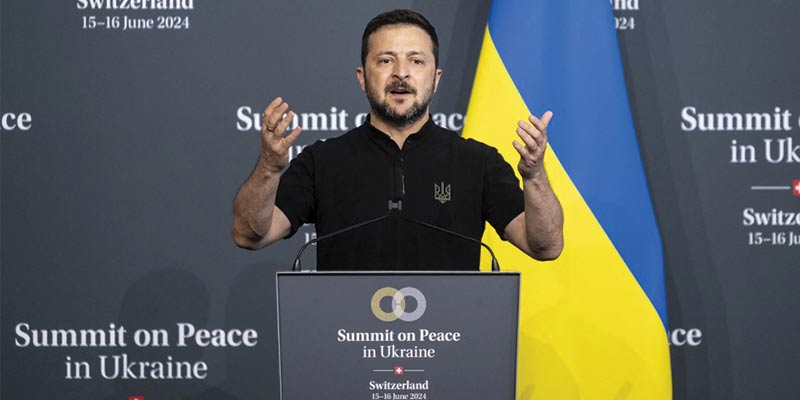- India
- Jun 18
- Kevin Savio Antony
India refrains from signing joint communique at Swiss Peace Summit
• India was among the countries that did not sign a joint communique at Switzerland-hosted Summit on Peace in Ukraine even as New Delhi called for “sincere and practical engagement” between Moscow and Kyiv for a peaceful resolution to the conflict.
• Russia was not invited to the summit while China decided not to attend it.
• India did not associate itself with any communique or document emerging from the Summit.
Why India refused to endorse Ukraine peace summit statement?
• India’s decision to abstain from endorsing the joint communique at the Peace Summit in Switzerland and its overall stance on the Russia-Ukraine conflict can be attributed to several key factors:
1) Neutral and balanced approach
• India has maintained a consistent policy of neutrality regarding the Russia-Ukraine conflict.
• By not endorsing resolutions or statements that are explicitly critical of Russia, India aims to balance its relations with both Russia and the Western countries supporting Ukraine. This balanced approach allows India to maintain its strategic partnerships and safeguard its national interests.
2) Emphasis on bilateral resolution
• India believes that a sustainable and lasting peace can only be achieved through dialogue and negotiations directly between Russia and Ukraine. India’s official stance, as stated by MEA Secretary (West) Pavan Kapoor, is that only solutions acceptable to both parties can lead to enduring peace. This perspective is reflected in India’s consistent call for practical and sincere engagement between the conflicting parties.
3) Strategic and economic interests
• India has significant strategic and economic ties with Russia, particularly in the realms of defence and energy.
• Russia is a key supplier of military hardware to India, and maintaining a strong relationship with Russia is crucial for India’s defence capabilities and energy security.
• This economic interdependence influences India's diplomatic positions to avoid antagonising Russia.
4) Global South and BRICS dynamics
• India’s participation in global platforms like BRICS and its identification with the Global South influence its foreign policy decisions.
• Countries in the Global South, including several BRICS nations, often share concerns about the impacts of geopolitical conflicts on food and energy security. By not taking sides, India positions itself as a mediator that can bridge gaps between conflicting parties and represent the interests of developing nations.
5) Multilateralism and global consensus
• India’s approach aligns with its broader commitment to multilateralism and seeking global consensus.
• By attending the summit but not endorsing the joint communique, India signals its willingness to engage in international dialogue while advocating for a comprehensive and inclusive approach to conflict resolution.
• This strategy enhances India’s image as a responsible global player that prioritises dialogue over unilateral actions.
6) Domestic and international diplomacy
• India’s abstention is also a reflection of its domestic and international diplomatic calculus.
• Domestically, taking a neutral stance avoids internal political divisions and maintains public support.
• Internationally, it allows India to act as a potential mediator and facilitator in peace processes, leveraging its diplomatic capital and non-aligned stance to build trust among diverse global actors.
What is the Swiss Peace Summit?
• The Swiss Peace Summit is an annual gathering held in Switzerland, bringing together global leaders, policymakers, activists, and scholars to discuss pressing issues related to peacebuilding, conflict resolution, and humanitarian efforts.
• It usually takes place in the summer months, providing a conducive environment for constructive dialogue and collaboration.
• The Summit attracts a diverse range of participants, including heads of state, diplomats, representatives from international organisations such as the United Nations, civil society leaders, academics, and grassroots activists. This diversity fosters inclusive discussions and innovative approaches to peacebuilding.
• Themes vary from year to year but often include topics such as conflict prevention, peace mediation, post-conflict reconstruction, human rights, gender equality in peace processes, and the role of technology in peacebuilding.
• The Summit aims to tackle both longstanding challenges and emerging issues in the field of peace and security.
Manorama Yearbook app is now available on Google Play Store and iOS App Store

